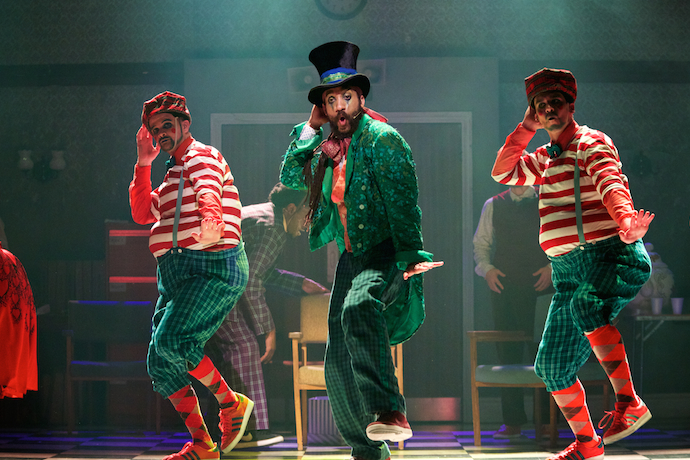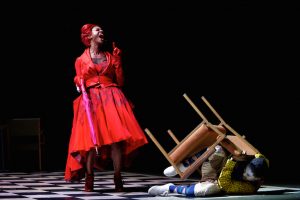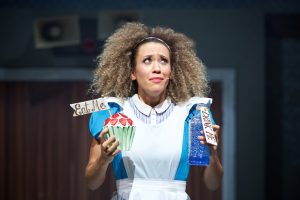
Roundhouse, Chalk Farm Road
By Sarah Kirkup
‘Curioser and curioser’, says Alice in Lewis Carroll’s fantastical tale, as she finds herself growing so rapidly that her head hits the ceiling. I could have said the same thing during Act I of ZooNation’s The Mad Hatter’s Tea Party, a Royal Ballet production originally for the Linbury Studio Theatre in 2014 that has been revamped for the Roundhouse in Camden. The ‘in-the-round’ seating and industrial vibe – exposed lighting rigs, bare light bulbs dangling – couldn’t be further from the Linbury’s set-up, and Kate Prince’s hip-hop dance company has, rightly, implemented some major changes, from pretty much rewriting the script to adding five new songs.
But Act I is a conundrum. I applaud Prince’s desire to take the stigma from the issue of mental health, and her idea of placing Carroll’s lead characters in an Institution for Extremely Normal Behaviour is a clever one, allowing us to explore their idiosyncrasies from a 21st-century perspective. But an Alice with anorexia and a White Rabbit with OCD doesn’t sit too comfortably with my idea of a family show ‘for all ages’. The Royal Opera House does include a caveat on its website stating that ‘some parental guidance’ may be required, but I’m not sure that all the guidance in the world could bring clarity to Tweedle Dum’s predicament. Split personality? A twinless twin? I never did figure it out.

And yet, out of the dark moments emerge glimpses of humour and choreographic pizzazz. We see Tweedle Dum and Tweedle Dee, both donning enormous fake bellies, sumo-wrestling each other in a Charleston-style number. A dapper Cheshire cat (Andry Oporia) struts his stuff to a reggae beat, breaking out into fierce aggressive steps when his drug-induced paranoia sets in. A smooth March Hare (Bradley Charles) smooches to a (pop singer) Prince-inspired song as he implores someone to love him. And even the feisty, killer-heel-wearing Queen of Hearts (the astonishing Teneisha Bonner) prompts guffaws during her recollections of childhood abuse when she manhandles the young doctor Ernest (Tommy Franzen, brilliant but underused in Act I) in a tango.
Each character has his or her own story to tell, which means we’re treated to a huge array of choreographic styles. Prince knows how to express the whole gamut of human emotion through movement, even within the realms of body-popping and break-dancing, and she’s aided by a terrific cast of unique, hugely talented dancers. And with each change of character comes a change of song, all performed live on a balcony above the stage by a superb band of musicians, two of whom – DJ Walde and Josh Cohen – are also the composers. The lyrics – which Prince also had a hand in writing – are terrifically witty (who’d have thought to rhyme ‘Alice’ with ‘Aurora Borealis’?) – and mainly sung by two soulful singers with voices to die for, Sheree Dubois and Elliotte Williams N’Dure. The band also morph into doctors in white coats, and Josh Cohen has his work cut out as the narrator.

If there are any doubts over the length and complexity of Act I, those are blown out of the water in Act II. We’re in Wonderland, a lush, spangly place where everyone can embrace who they really are. Dr Ernest has given up trying to ‘therapize’ everyone and, having been carted out of the Institution in a catatonic state, now finds himself unable to resist the lure of this magical universe. It’s not long before he is dancing on an enormous table laden with oversized teapots along with all the others. The music transitions from ’70s disco to rap to a song recalling Paloma Faith’s ‘New York’, the band scatting and swapping instruments (N’Dure on bass is a sight to behold). The action on stage resembles one big dance-off. When the dormouse pops out of his teapot and croons to Alice, Barry Gibb-style, he brings the house down.
The narrative has all but disappeared. The white-coated doctors make a reappearance, but are swiftly disposed of courtesy of a custard pie-throwing contest. We meet Ernest’s mysterious predecessor, but he soon falls under Wonderland’s spell. And when members of the audience are invited up on stage to freestyle, any semblance of story development is lost. ‘There’s no such thing as normal’, the characters declare, their previous anguish now replaced by unimpeded joy. Is this a realistic outcome for those with mental health problems? Probably not, although accepting people as they are is surely a vital stepping stone in overcoming such issues. But if Act II is somewhat ‘off-message’ compared to Act I, it’s all the more welcome for it. We, the audience, are finally free to revel in the sheer exuberance of dance – no strings attached. And if the overriding moral is that dancing is good for our mental health? Well, I take my hat off to that. ![]()
The Mad Hatter’s Tea Party runs until January 22. For tickets, visit roh.org.uk or roundhouse.org.uk